Trash to Treasure: The Recycling and Reuse Industry
The recently completed Indiana Recycling Economic Information (REI) Study proves that efforts to recycle and reuse scrap add significantly to Indiana's economy. Materials that used to be considered waste have now become value-added raw materials and move through collection, processing, remanufacturing and sales-all the while adding to Indiana's economy. For many Indiana companies, recycling is a way of business.
Indiana's recycling and reuse industry includes 1,700 establishments, employs approximately 75,000 people and has an annual payroll of $3 billion while generating $19 billion in annual revenues. The recycling industry contributes $285 million in state government tax revenues on an annual basis.
The recycling and reuse industry is involved in metals, paper, plastics, glass, organic materials, computers and electronics, tires, and other post-consumer and post-industrial scrap. Jobs in this industry involve collection, processing, reuse, remanufacturing, sales and more.
Per Capita Employment: Indiana Tops the List
The REI Study results indicate that Ohio has the largest number of recycling and reuse employees, followed closely by California. Both states have much larger populations than Indiana. When employment data are adjusted to account for population differences, Indiana has the most recycling and reuse employees per capita of the states participating in the U.S. REI Study (see Figure 1).
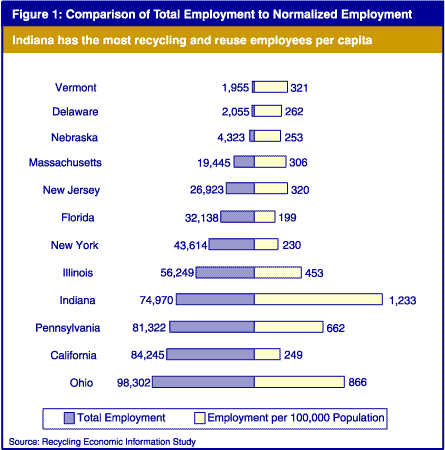
Comparing to Other Indiana Industries
The recycling and reuse industry compares favorably to several other strong Indiana industries. Comparisons by the number of jobs show that there are more recycling and reuse jobs in Indiana than there are jobs in the biomedical or insurance industries. Especially significant is the finding that recycling far outpaces the waste management industry because recycling adds value to materials, contributing to a growing labor force, and does not lose the value of the material through disposal.
Supporting Diverse, Well Paying Jobs
The study also shows that recycling and reuse jobs generally pay above the average state wage (see Figure 2). The average industry wage for Indiana recycling and reuse jobs is $41,200-approximately $14,000 or 52% more per year than the Indiana average wage. Figure 3 compares wages in the various recycling sectors.
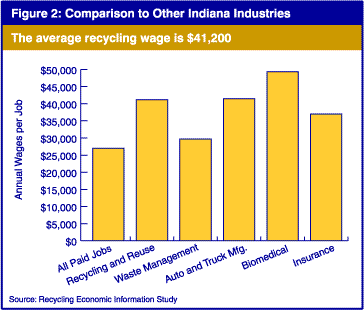
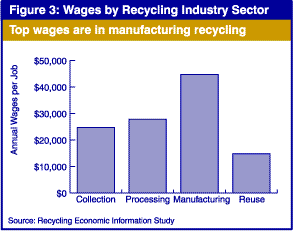
Recycling and reuse jobs are found in businesses that collect, process, manufacture and reuse materials:
- Both public and private sector entities are involved in collection activities, which include collection from local curbside and drop-off programs as well as collection from business and industry.
- Processors are companies or public entities that prepare materials to be sent to the marketplace for recycling. This includes facilities that separate recyclables generated by households and those that prepare industrial-generated scrap material, such as plastic converters, for reentry into the manufacturing process.
- Manufacturers use the scrap to make a new product, such as metals, paper, compost, plastics and rubber products.
- Reuse industries are widespread and range from the more traditional establishments such as local thrift stores and antique shops to more recent, dynamic operations such as computer demanufacturers, pallet rebuilders and material exchanges.
There are more companies in the reuse sector of this industry than in the other three sectors (see Figure 4). There are a similar number of manufacturers and processors and a smaller number of entities that collect material. However, manufacturing entities have a significantly larger number of employees than the other sectors (see Figure 5). Reuse companies are smaller with few employees. The collection and processing sectors make up a smaller portion of total employment but have the very important job of providing feedstock material to the manufacturing and reuse sectors.
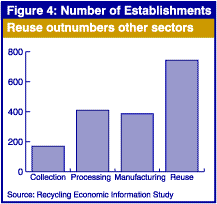
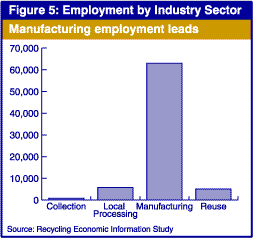
Manufacturing Recyclables into New Products
The recycling manufacturing sector has a much greater impact on Indiana's economy than the recycling collection, processing and reuse sectors. The recycling manufacturing sector accounts for 63,000 jobs, $2.8 billion in payroll and $16.8 billion in receipts each year. Ninety-two percent of Indiana's total recycling and reuse industry tax revenues arise from recycling manufacturing establishments and their indirect and induced economic activity.
Indiana's recycling manufacturing sector is strong and covers a wide range of industries (see Figure 6). There are local markets for many of the recyclables generated by households as well as by the commercial and industrial sectors in Indiana. Recycling scrap materials feeds directly into building Indiana jobs. Local public and private investments in the collection and processing of recyclables, as well as public policies favoring recycling and reuse, are supporting larger private sector investments in downstream processing and manufacturing.
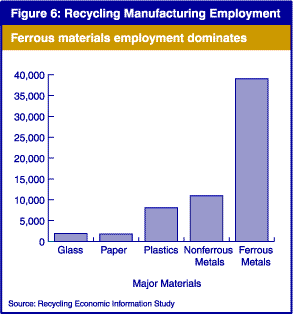
Recycling manufacturers are found in long-established sectors such as paper and steel making, as well as in new entrepreneurial fields such as composting and plastic and rubber product manufacturing. The recycling industry also includes companies that are quickly finding a market niche, such as computer demanufacturers, construction and demolition recyclers, and recycled plastic product manufacturers.
More than 70% of the economic activity in the recycling and reuse industry is accounted for by four recycling manufacturing sector categories: steel mills, iron and steel foundries, nonferrous metals foundries, and recycled plastics products manufacturers. These four categories alone account for 71% of all employees, 79% of wages and 75% of total receipts for Indiana's recycling and reuse industry.
Although these industry categories make up the bulk of the economic activity, other recycling manufacturing industries exist in Indiana for many other materials. These also compare strongly with other states' recycling activities.
Many of our industrial sectors have such a high demand for recovered materials that a significant amount of material is purchased and imported from other states and countries-to Indiana's benefit. Many of these industries' products support other manufacturing employment or bring profits into the state from the sale of those products outside Indiana's borders. Indiana's economy significantly benefits from this industrial sector in terms of the jobs it provides, the support it gives to the state's manufacturing base and other economic sectors, and tax revenues that flow to the state and local governments.
Spurring 'Downstream' Economic Impacts
Public and private sector investment in Indiana recycling and reuse collection, processing and manufacturing spurs significant 'downstream' economic activity: the indirect impact of recycling on support industries, such as accounting firms and office supply companies. The REI Study calculated the indirect economic impact of this industry, as well as the 'induced' impact-the economic effects of employee spending.
All told, the recycling and reuse industry supports 7.9% of the jobs in Indiana-2.5% through direct employment and 5.4% by industry and employee spending in the economy. Of Indiana's gross state product, 7.2% is attributable to the industry, 2.8% provided directly and 4.4% through spending in the economy. The recycling and reuse industry also generates roughly $285 million in state government tax revenues on an annual basis.
